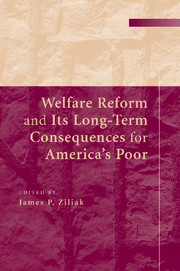Book contents
- Frontmatter
- Contents
- Contributors
- Preface
- Introduction
- 1 What We Know, What We Don't Know, and What We Need to Know about Welfare Reform
- 2 Welfare Reform and the Level and Composition of Income
- 3 How Have Expansions in the Earned Income Tax Credit Affected Family Expenditures?
- 4 How Families Are Doing Nine Years after Welfare Reform: 2005 Evidence from the Three-City Study
- 5 The Impact of Welfare Reform on Leaver Characteristics, Employment, and Recidivism
- 6 A Reexamination of the Impact of Welfare Reform on Health Insurance Among Less-Skilled Women
- 7 How Welfare Policies Affect Child and Adolescent School Performance: Investigating Pathways of Influence with Experimental Data
- 8 The Effects of Welfare and Child Support Policies on the Incidence of Marriage Following a Nonmarital Birth
- 9 Welfare Reform and Health among the Children of Immigrants
- 10 Mismatches and Unmet Need: Access to Social Services in Urban and Rural America
- Index
3 - How Have Expansions in the Earned Income Tax Credit Affected Family Expenditures?
Published online by Cambridge University Press: 21 January 2010
- Frontmatter
- Contents
- Contributors
- Preface
- Introduction
- 1 What We Know, What We Don't Know, and What We Need to Know about Welfare Reform
- 2 Welfare Reform and the Level and Composition of Income
- 3 How Have Expansions in the Earned Income Tax Credit Affected Family Expenditures?
- 4 How Families Are Doing Nine Years after Welfare Reform: 2005 Evidence from the Three-City Study
- 5 The Impact of Welfare Reform on Leaver Characteristics, Employment, and Recidivism
- 6 A Reexamination of the Impact of Welfare Reform on Health Insurance Among Less-Skilled Women
- 7 How Welfare Policies Affect Child and Adolescent School Performance: Investigating Pathways of Influence with Experimental Data
- 8 The Effects of Welfare and Child Support Policies on the Incidence of Marriage Following a Nonmarital Birth
- 9 Welfare Reform and Health among the Children of Immigrants
- 10 Mismatches and Unmet Need: Access to Social Services in Urban and Rural America
- Index
Summary
Introduction
Since the passage of the 1996 Personal Responsibility and Work Opportunity Reconciliation Act (PRWORA), millions of welfare recipients have left welfare and entered the workforce. For many the transition from welfare to work has not reduced economic hardship, partly because a significant proportion of the income gain from work is offset by the loss in cash benefits, as indicated in Chapter Two of this volume. Many struggle to make ends meet based on earnings from low-paid jobs. Even families whose incomes are modestly above the official poverty line often face significant material difficulties (Blank 2002, 2006; Grogger and Karoly 2005; Grogger, Karoly, and Klerman 2002; Lichter and Jayakody 2002). Our prior research on the effects of welfare reform on family expenditures suggests that families affected by the reforms have increased expenditures on work-related expenses such as transportation, adult clothing, and food away from home (Kaushal, Gao, and Waldfogel 2007).
One very prominent element of welfare reform was the increased generosity of the Earned Income Tax Credit (EITC). In an effort to make work pay, the federal government dramatically increased non welfare support for low-income working families, in particular the EITC. Viewed by policymakers as an integral part of welfare reform, the EITC is widely considered—in the words of former New Jersey Senator Bill Bradley— “an effective, practical tool that provides working Americans the chance to climb the economic ladder to the middle class and build better opportunities for their families” (Bradley in “Proposes to Restore Funds for Earned Income Tax Credit” on October 24, 1995, as cited in Williams 1997; see also Ellwood 2000).
- Type
- Chapter
- Information
- Welfare Reform and its Long-Term Consequences for America's Poor , pp. 104 - 139Publisher: Cambridge University PressPrint publication year: 2009
- 8
- Cited by



